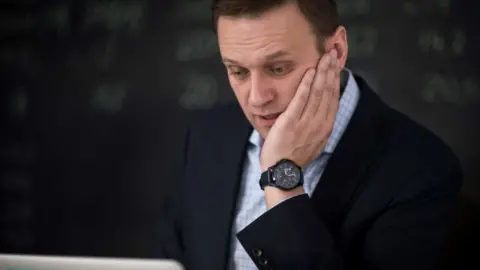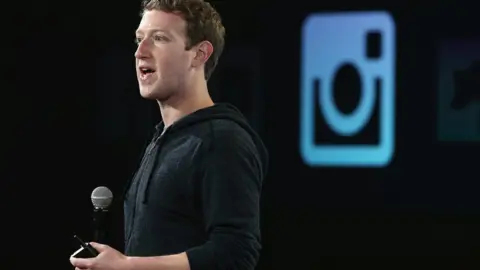Instagram submits to Russia censor's demands
 Getty Images
Getty ImagesInstagram has blocked posts in Russia relating to corruption claims made by the country's most prominent opposition leader.
It follows a demand by the country's internet censor that the Facebook-owned service restrict access to posts on its platform connected to allegations made by Alexei Navalny.
Its response contrasts with that of Google's YouTube service.
It had been ordered to block several clips before the end of Wednesday.
But it has taken no such action.
The controversy followed a YouTube video posted by Mr Navalny's Anti-corruption Foundation last week that allegedly shows the billionaire Oleg Deripaska meeting with Russia's deputy prime minister Sergei Prikhodko aboard a yacht.
The 25-minute upload has been watched more than five million times.
YouTube has not commented on the matter.
Local internet service providers are said to lack the ability to block specific Instagram and YouTube posts.
That had led to speculation that the ISPs might block the services outright.
Some ISPs have already taken such action against Mr Navalny's own website to comply with an order by Russia's communications regulator, Roskomnadzor.
The watchdog acted after a court ruling last week that Mr Deripaska's privacy rights had been violated.
The tycoon has claimed that allegations made against him are "false" and "outrageous".
'Shame on you'
Mr Navalny has been barred from standing against President Putin in next month's election because of a separate corruption conviction, which he says was politically motivated.
In a tweet, he accused Instagram of having given in to an "illegal censorship request".
"Shame on you, @instagram!" he added.
The BBC understands that a female model embroiled in the corruption claims had already removed some of the material herself, but that Facebook complied with an order to remove two remaining posts.
Neither of the two were from Mr Navalny's own account.
 Getty Images
Getty ImagesA spokeswoman for Facebook would not discuss the specifics of the case but confirmed that it had decided to comply with Roskomnadzor's demands.
"When governments believe that something on the internet violates their laws, they may contact companies and ask us to restrict access to that content," she said.
"We review such requests carefully in light of local laws and where appropriate, we make it unavailable in the relevant country or territory.
"We are transparent about any content restrictions we make for government requests with local law in our Transparency Report."
The most recent reference to Russia in the firm's transparency report dates back to June 2017 and states that it had restricted 156 pieces of content over the previous six months in the country.
Roskomnadzor has said that it is still waiting for YouTube to take action against a video it wants blocked.
